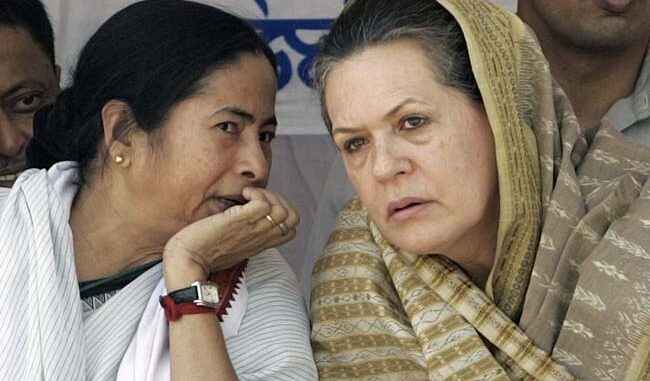
NEW DELHI: In a surprising turn of events, Mamata Banerjee on Wednesday announced her decision to contest the upcoming Lok Sabha elections in Bengal independently, abandoning the much-anticipated Congress-led INDIA alliance for the 2024 polls. The delay in seat-sharing discussions had been raising concerns, making this a significant blow to opposition unity. Mamata’s move is particularly unsettling for the Congress leadership, as other potential allies may now explore the ‘solo journey’ path.
Congress’s Cold Shoulder
Mamata accused the Congress of rejecting all her proposals, leading to her decision to go solo in the Lok Sabha elections. She pointed out the lack of information regarding Rahul Gandhi’s ongoing justice yatra, adding fuel to the fire. With the ‘India Gathbandhan’ preparing for its justice journey, Rahul Gandhi finds himself in Assam, intensifying the political landscape.
TMC’s Concerns In West Bengal
TMC’s decision not to ally with the Left in West Bengal has created a political stir. Mamata, despite facing humiliation, stated she had adjusted in the interest of the India front. However, concerns about Left dominance in India Group linger. Today, she declared that, as Congress did not accept all her proposals, she will contest the Lok Sabha elections alone.
Pressure Tactics And Political Maneuvers
Political analysts view Mamata’s move as a strategic pressure play, and some suggest it might be a risky move for TMC. Congress understands the significance of retaining TMC in Bengal and might be compelled to compromise to maintain the opposition stronghold. Meanwhile, several Congress leaders, including Adhir Ranjan Chowdhury, have launched sharp attacks on TMC in recent days. It appears Mamata’s patience has worn thin, and she has accused Rahul Gandhi of keeping her in the dark about his journey, potentially indicating pressure politics.
BJP’s Swift Response
Nalin Kohli, BJP’s spokesperson, took a jibe at Rahul Gandhi’s journey, questioning the absence of communication between him and Mamata. He raised concerns about the alliance’s existence if there is no dialogue. BJP’s focus remains anti-Modi without any positive agenda, lacking both leaders and a clear office structure.
Bihar’s Political Quandary
In Bihar, confusion reigns as JD(U) and RJD discuss seat-sharing, while Lalu’s party engages with Congress. Speculations arise about whether Nitish Kumar, a key player in the India alliance, will avoid sailing on the NDA ship, especially with signals like Amit Shah’s softening stance and conferring Bharat Ratna to Karpuri Thakur.
JD(U) spokesperson K.C. Tyagi emphasized the strength of JD(U) and RJD as major parties in Bihar. While he criticized RJD and Congress for delaying seat-sharing, JD(U) suggested a softer approach towards regional parties.
AAP’s Similar Approach
The alliance dynamics continue to evolve, with pressure mounting on Congress from JD(U), AAP, and other regional players to limit its role. Arvind Kejriwal’s recent meeting with Punjab CM Bhagwant Mann and ministers from Punjab suggested a clear AAP strategy for contesting all 13 seats independently.
SP’s Seat Demands In UP
In Uttar Pradesh, negotiations remain tense as SP eyes 70-72 out of 80 seats, leaving only 4-5 seats for Congress. UP Congress leaders, however, demand a more substantial share, possibly around 17-18 seats. Akhilesh Yadav’s dissatisfaction looms, and a seat-sharing agreement in UP remains elusive.
BSP’s Unpredictable Role
The Delhi meeting discussed including BSP in the alliance, but SP objected. Mayawati hinted at potential collaboration in the future. The verbal sparring between Akhilesh and Mayawati could benefit the BJP in UP.
Maharashtra’s Political Quagmire
Maharashtra faces uncertainties as alliance discussions seem inconclusive, reflecting challenges in opposition unity. The road to opposition unity appears fraught with challenges, with each party navigating its path strategically. The political landscape remains dynamic, and the final contours of alliances are yet to be defined. The upcoming elections will undoubtedly shape the future course of Indian politics.
Bureau Report
Leave a Reply